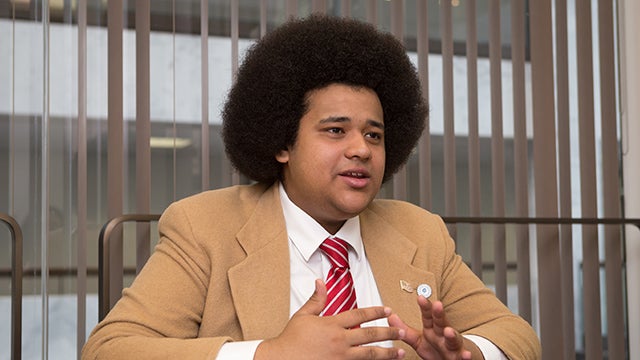Americans know well the mythology of our founding. It’s a story of freedom and exceptionalism, a rich stew of heroism flavored by divine providence and high moral aspirations.
Yet this story cannot bear its own weight; it has been deeply contested from the start. America’s true story is one of contradictions, of achievement and failure, its identity rooted in both inequity and opportunity. “Who Is Us?: A Project on American Identity” aims to examine how Americans from a multitude of backgrounds are grappling with the question of what it means to be American today. The goal is to forge a greater consensus around shared narratives that embrace a more pluralistic American identity. The project is a partnership of the Institute’s Citizenship & American Identity Program and the Democracy Fund.
The question “who is us?” is a question we’ve been asking and debating since even before we became a nation. It has driven much of the most significant conflicts and achievements of our nation’s history from the Civil War to the passing of the 19th Amendment. The question of the identity that binds a nation together matters more in a democracy of diverse ancestry, religion, ideology, and relationships to the land. We believe that embracing a fuller understanding of “us” is not only a challenge but also an opportunity. And that it is in our own best interest to do so. Here are five reasons why.
1. We are at a familiar inflection point.
We are in a moment when the fundamentals of American identity are hotly debated. This contestation is manifesting in all kinds of ways, from our policies around immigration, to protests for racial justice, to the politics of mask-wearing, we are grappling with deciding what our common story is and what that means for how we treat each other.
In some ways, we have always been debating the question “who is us”, since before we became a nation. We’ve confronted the question in different ways over time—over the status of enslaved people, over questions of citizenship for Chinese Americans and voting for women, in debates about immigration and assimilation. Many times in the past, we have found enough agreement on an answer to enable the country to move forward. We abolished slavery, we passed the 19th Amendment, we removed legal barriers to voting for Indigenous Americans and Black Americans. But we’ve always been forced at some point to re-enter into the debate on this question and forge a new consensus.
Now is a critical time to revisit the question of Who Is Us. We are still relatively early on in the 21st century, a few years away from our 250th national celebration of independence, and in the midst of coming through the biggest public health and economic crisis in 100 years. What are we going to do in this moment? Who are we going to be? And what do we need to more fully understand and internalize about who we have been in the past, that can help us answer that question?
2. Identity is both what we choose to remember and to forget.
One way that our identity is manifested is in the way that we learn about, speak about and honor our history. Narrow narratives of American identity tend to disproportionately embrace the positive stories of early white settlers while erasing the violent pieces of that history. The history of slavery, Jim Crow, and Indigenous American assimilation and forced migration is also the story of the US. It lives alongside the story of our independence, our growth, our prosperity, and our radical experiment in self-government. We can celebrate the good parts of our history while remaining honest about the bad parts; both exist at once as part of who we are as a nation. By flattening our history to the point that so much of our reality is erased, we prevent any meaningful learning and forgo the opportunity to acknowledge and learn.
3. Narratives shape perspectives on policy.
Consider the act of voting: The question of who gets to exercise this right is inherently tied to the question of who belongs. One way that we have confronted the question of “who is us” throughout history is through the struggle for inclusion in voting rights. We re-negotiated our understanding of who we are as we pushed to become a more inclusive country for women, Asian-Americans, Indigenous Americans, Black Americans, young people. This is very much tied to the arc of an American story of struggle, progress, and resilience in the face of setbacks.
Narrative also shapes how we decide who gets to become an American. Throughout our history othering narratives have been used against immigrant populations as a defense mechanism against perceptions of economic and cultural threat. Over the last several years, the US has similarly witnessed a rising tide of nationalism and nativism, which each promote a narrow definition of who belongs in this country. These narratives have influenced policies, from travel bans to visa denials, to the US-Mexico border wall, which have drastically reduced the levels of new arrivals and fostered a hostile environment for new Americans. This sentiment is at odds with the United States’ traditional role as a beacon to people seeking refuge and economic opportunity.
4. Americans are capable of embracing nuance.
The majority of Americans are proud and grateful to be American. A study conducted by the organization More in Common in December 2019 found this to be true across demographic groups, including race, ethnicity, age, sex. The report also points out that our debate is often over-simplified to one of American success versus American failure. But debates about American identity should not be structured in binary terms. There are parts in our country’s past of which we should be proud and celebrate. There are also profound failures that deserve greater acknowledgment and atonement, and from which we should continue to learn. Americans actually have a more nuanced view of our story than is often discussed. We see both the flaws and the strengths. We believe that developing this fuller story can reveal how American identity can and should evolve.
5. We are greater than the sum of our parts.
This project isn’t looking to challenge our identity or replace the story as we know it. We are advocating adding to the story, filling in the gaps, owning the good with the bad—not as the story of one group’s experiences, but as our omni-cultural story, one in which many identities are experienced at once.
Through exploring and articulating the omni-cultural story of America, we believe we can help to equip ourselves with the language, the common understandings, and the mutual respect for difference that will enable us to develop a shared narrative of what it means to be an American.



